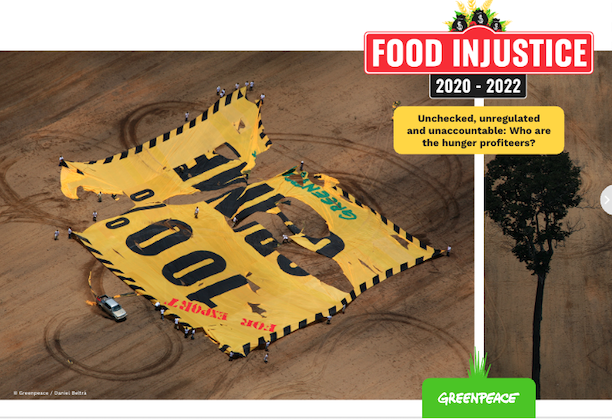The world’s biggest agribusiness corporations made more in billion-dollar profits since 2020 than the amount that the UN estimates could cover the basic needs of the world’s most vulnerable, a new report by Greenpeace has found, exposing rampant profiteering from the war in Ukraine and the coronavirus pandemic.
The 20 corporations – the biggest in the sectors of grain, fertiliser, meat and dairy – delivered $53.5 billion to shareholders in the financial years 2020 and 2021, while the UN estimates a smaller figure, $51.5 billion, would be enough to provide food, shelter and lifesaving support for the world’s 230 million most vulnerable people.[1]
Davi Martins, campaigner at Greenpeace International, said: “What we are witnessing is an enormous transfer of wealth to a few rich families that basically own the global food system, at a time when the majority of the world population is struggling to make ends meet. These 20 companies could literally save the world’s 230 million most vulnerable people and have billions of profit left over in spare change. Paying more to shareholders of a few food corporations is just outrageous and immoral.”
Greenpeace International commissioned research to analyse the profits of 20 agribusiness corporations across the globe during 2020 – 2022, the period of Covid-19 and since Russia invaded Ukraine – while looking into how many people have been affected by food insecurity and the extreme rise of food prices across the globe over the same period of time.[2] The key findings showcase how big agricultural corporations exploited these crises to gain grotesque profits, plunging millions more into hunger, and tightening their grip on the global food system, only to pay outrageous amounts of money to their owners and shareholders.
Davi Martins added: “Just four companies – Archer-Daniels Midland, Cargill, Bunge and Dreyfus – control more than 70% of the world’s grain trade, but they are under no obligation to disclose what they know about global markets, including their own grain stocks. Greenpeace found that lack of transparency around the true amounts of grain in storage following Russia’s invasion of Ukraine was a key factor fuelling speculation on food markets and inflated prices.[3]
“These corporations are so greedy they have pushed small scale farmers and local producers, whose purpose is to actually feed people, out of the system. Governments and policy makers need to act now to protect people from the abuses wrought by large corporations. We need policies that regulate and loosen the grip of corporate control on the global food system, or the current inequities will only deepen further. Essentially, we need to change the food system. Failure to do so is costing millions of lives.”
Greenpeace supports a shift to a model of food sovereignty, a collaborative and socially just food system, where communities have control and power over how it’s shaped; governments at international, national, and local level, all have key roles to play to eventually put an end on corporate control and monopoly in the food system. It is incumbent on governments and policy makers to take measures and adopt policies that ensure transparency and tighter regulation on the sector’s operations.
Notes
[1] According to the 2023 Global Humanitarian overview, the estimated cost of the humanitarian response going into 2023 is US$51.5 billion, a 25% increase compared to the beginning of 2022. This amount can save and support the lives of a combined 230 million people worldwide.
[2] The 20 companies comprising Greenpeace International research focus are Archer-Daniels Midland, Bunge Ltd, Cargill Inc., Louis Dreyfus Company, COFCO Group, Nutrien Ltd, Yara International ASA, CF Industries Holdings Inc, The Mosaic Company, JBS S.A., Tyson Foods, WH Group/Smithfield Foods, Marfrig Global Foods, BRF S.A., NH Foods Ltd, Lactalis, Nestlé, Danone, Dairy Farmers of America, Yili Industrial Group
[3] IPES report, Another Perfect Storm?, identifies four companies that control 70% of the world’s grain trade
Original source: Greenpeace @greenpeacepress
Image credit: Daniel Beltrá / Greenpeace

